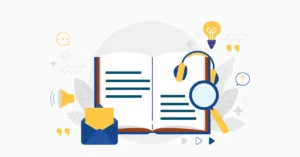
IGCSE English as a Second Language: Listening, Writing, and Speaking
Preparing for your IGCSE English as a Second Language (ESL) exam can feel daunting. You are not just learning grammar
Learn how to write step-by-step answers, and score A* in your exam!

Announcement: Cambridge IGCSE, O Level and AS & A Level June 2025 past papers are now available.
You may be asked to write an informal letter to a friend or family member. Often, the question will require you to describe or explain something, or it may ask you to say what you think about a suggestion or a plan. The exam question will give you some ideas, and will tell you what you should include in your letter.
Remember: It is important to show that you can write in an informal style.
Write a short introduction for this post:
Make sure that you follow all instructions very carefully and write the required number of words. Aim for 15 words plus or minus from the maximum word limit guideline.
For English First Language Extended syllabus, aim for 435 words or so; or in the range of 435-465 words.
For English as a Second Language Extended syllabus, aim for 145 words or so.
Though there is no penalty in writing more than the suggested limit, it would be self-penalising to wrote more as you leave no time for other questions.
When you write, use your imagination as much as possible, but remember that your answer must always be relevant to the question.
One way to improve your writing is by using more adjectives and adverbs.
Example:
We had food and the music was good.
The above sentence could be made better by applying some adjectives like the below sentence.
We ate delicious food and the music was fantastic!
For example: Up to nine marks are awarded for content, and up to nine marks for language.
“Content” refers to the relevance and development of ideas; “language” refers to style and accuracy.
Below are some important points about writing a formal letter in your IGCSE exam:
You may be asked to write an article or a narrative, describe something or to write something persuasive. It is important that you read the question very carefully and that you express yourself effectively. You should also show that you can vary the style of your writing, depending on the topic.
In all the English subjects papers, you’ll be required to summarise a text. Below are some important points to help you score maximum marks for this section:
You may be asked to write your opinion about something in the form of a newspaper article, or perhaps for your school newsletter or magazine.
For English First Language, be sure to cover all the bullet points given.
For English as a Second Language, usually you will be given help in the form of a list of ideas or other people’s opinions, but you do not have to use them in your answer. You are free to use your own ideas, just be sure to keep to the topic.
You must show the examiner that you can use the English language for a specific purpose and that you can organise your ideas in a logical way.
Although you don’t have much time for planning, you should underline the key word(s) in the question to ensure you do exactly what is asked.
Write very brief notes, putting your ideas into a logical order. Also, check for repetition. When you have finished your writing, check your spelling, grammar and punctuation.
Join 62,169 (and counting) IGCSE & AS/A Level subscribers who’ve taken our insanely valuable FREE email courses. Learn exam tips & score A* in your exam!
Tan
Tan
Kanishka Bhindora
Kanishka Bhindora
Arun Joseph
Botswana
Arun Joseph
Botswana
Sree Sundararaman
Sree Sundararaman
Nisha
Nisha
Rachel Miller
Rachel Miller
Ved Vyas
Kenya
Ved Vyas
Kenya
Adriano Jose
Adriano Jose
Feras
United Arab Emirates
Feras
United Arab Emirates
Tino Mutangadura
South Africa
Tino Mutangadura
South Africa

Preparing for your IGCSE English as a Second Language (ESL) exam can feel daunting. You are not just learning grammar

Choosing the right educational pathway for your child is one of the most significant decisions a family can make. In

The IGCSE English First Language exam places a strong emphasis on creative writing, with writing descriptive and narrative essays being

In the IGCSE English First Language Directed Writing task, you’ll be required to either write a speech, letter, or article
616 responses
Hello IGCSE,
I am not very good student in English. I don’t have much vocabulary or other creativities. But i want to do well. I am confused in writing Section-B articles and Section-C essays. Can you please help me and say how can make my article more catchy, sharp. also let me know what types of essay are best for scoring good grades and how can i improve my skills.
Thanks
Hi Peyton,
Article writings need a lot of good facts. If you can include some in your writing, you can fetch good marks.
We can’t tell you which essay is best for you. You must assess your own strength. Try to write different types of essays and let your teacher marks them. You would be able to find out which is your best strength, and you can concentrate in that.
In note making do i have to start with capital letter. What will happen if I start with simple letter and does not use punctuation? My teacher says that we have to use only simple letters except for words like people’s names etc. I am very confuse after reading the comments above, Please gove me an answer soon.
In a summary if a point is given by using you can i use that pot by using you or do i have to use I.
for example:you should not talk while eating (as an example for a point in a summary)
if this point is given do i have to use “I” or just use “you” when stating this pont?
Hye,do you have any tips for article writing especially when they ask to give example and should i choose and write one of the comment or both? Since my teacher told me to choose one :one positive comment and one negative comment. But when i saw the example for article writing,they write all the comment. It’s make me confuse.
Hi Amira,
You must follow the instruction in the question. Normally the question will ask you to list the good and bad, then provide your own opinion.
Read the question carefully, you have got all the instructions clearly stated in the question.
Hi igcse team
I am Rachel
I have my English paper tomorrow and I am very scared for the letter writing……I don’t understand what the question is asking us to do ………pls help!!
Hi Rachel,
Read this, it helps: https://www.skolatis.com/9-powerful-tips-to-score-in-writing/